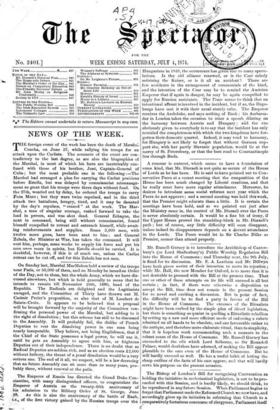On Sunday last, Marshal MacMahon held a review of the
troops near Paris, or 50,000 of them, and on Monday he issued an Order of the Day, not to them, but the whole Army, which we have dis- cussed elsewhere, but which is held generally to mean that he intends to remain till November 20th, 1880, head of the Republic. The Radicals are delighted and the Legitimista enraged, and the Committee of Thirty have thrown out M. Casimir Perier's proposition, as alsd that of M. Lambert de Sainte-Croix. It appears to be believed that a proposal will be brought forward by the majority of the Committee con- firming the personal power of the Marshal, but adding to it the right of dissolution ; but this scheme has still to be discussed in the Assembly. It will probably fail, the dislike of French Deputies to vest the dissolving power in one man being nearly insuperable. They believe, not being Englishmen, that if the Chief of the State possesses a legal power, he will use it, until he gets an Assembly to agree with him, or frightens Deputies out of their independence. There is no doubt that as Radical Deputies are seldom rich, and as an election costs £2,000 without bribery, the threat of a penal dissolution would be a very serious one. The end of it all, we suspect, will be a law decreeing that no future Assembly can sit more than no many years, pro- bably three, without renewal at the polls.


































